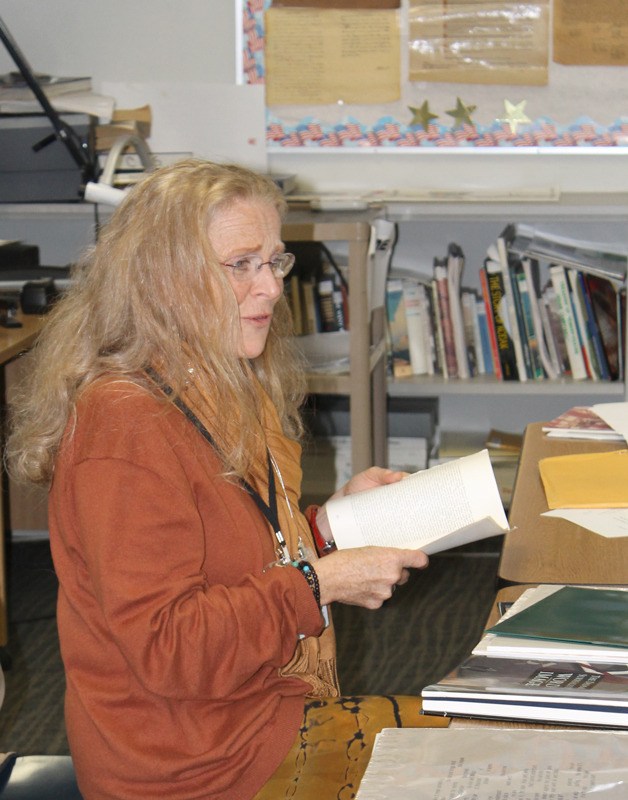Ánie McMahon-Grace, a Clinton resident, homeschool student and aspiring author, sat patiently at the front of the classroom at Coupeville Middle School Saturday afternoon, pen and notebook at the ready, awaiting author Deb Lund’s instructions on how to become “a fiction magician.”
McMahon-Grace was one of several teens and young adults who attended this year’s Whidbey Island Writers Conference, seeking the opportunity to converse with fellow writers and learn more about her craft through workshops such as Janet Lee Carey’s class on World Building, Deb Lund’s class on tips and tricks for writers and Nicole J. Persun’s writing and publishing class which was designed specifically for young people.
McMahon-Grace said she has been writing for quite some time, and is presently working on a steampunk book and another about ghosts in the White House, but had yet to take any formal classes. More than a writer, the precocious teen said she is determined to be a proponent for demolishing stereotypical story patterns. Her villains will not wear black; male and female characters in her books may become friends without developing a romance.
“It feels like 90 percent of the time that happens,” she said.
Over 200 Pacific Northwest writers like McMahon-Grace came from Oak Harbor to Bellevue and beyond to convene for the 16th annual conference, an event put on by the Northwest Institute of Literary Arts.
On Friday, writers and presenters gathered in bed and breakfasts and private homes throughout Coupeville for chat house sessions which were followed by a slew of evening activities such as open-mic poetry and fiction readings.
Saturday kicked off with keynote speakers Aaron Patterson and Nicole J. Person, the latter of whom presented the Young Writers Conference.
These were followed by the afternoon workshops, including another session for Young Writers, and opportunities for attendees to consult one-on-one with agents and editors and an evening book signing reception and party at Greenbank Farm complete with music by Western Heroes and an emotionally provocative keynote presentation by Daniel James Brown. The final day commenced with casual conversations about marketing, craft, publishing and poetry at Greenbank Farm.
According to Northwest Institute of Literary Arts Marketing Director Jeanne Juneau, the numerous emails and comments from attendees expressing positive feedback about the conference have been “the best measure of success I could have imagined.”
Janet Lee Carey, author of six published young adult books with a seventh in the works, attended and presented at the conference for the first time Saturday afternoon. Her workshop on building the intricate and fantastical worlds of science fiction and fantasy attracted a number of writers interested in subjects such as the linguistics of fictional languages and the character of setting.
Carey has presented as a workshop leader and keynote speaker at several other conferences such as the Pacific Northwest Writers Conference, the Surrey International Writers Conference and the Society of Children’s Book Writers and Illustrators, but wrote in an email to The Record that she had been impressed with the Whidbey Island Writers Conference’s “strong craft focus.”
“Craft savvy and marketing savvy are both key parts of a successful writing career, but we shouldn’t let marketing eclipse craft,” wrote Carey. “Happily, the Whidbey Island Writers Conference had a great balance of both.”
During Carey’s Saturday afternoon workshop on world building, she pointed out that any experience can be used in the construction of a fictional story, recalling her own experience living on a commune with her husband as an example. Carey said these experiences informed her creation of the fairy society in her book Dragonswood, although she noted that she and her husband did not live on the same sort of “free love” centered commune present in the book; a commune of that kind neighbored the one on which she lived.
“I thought a communal living situation with no marriage and ‘free love’ would be interesting,” wrote Carey of the creation of the Dragonswood world. “That communal living along with a monarchy not based on birth but on the concept of dominating alpha animal — the one with the most power reigns —helped me create an interesting fairy kingdom.”
Jim Freeman, host of Friday evening’s poetry slam at Bayleaf in Coupeville, said there were 14 poets who stepped up to the mic to share pieces with the group.
“All of the poems are as unique as their authors,” said Freeman, who read aloud his own poem “Ode to a Load.”
During the slam, poets were tasked with creating poems on the spot using at least three of 18 audience-produced words. All readers received prizes from Freeman’s shed.
“Our slams are poetry hugs, not really slams,” said Freeman, who has been hosting a poetry slam at the conference every year since its inception.
“All are winners,” he said.
For more information about the conference visit nila.edu.



